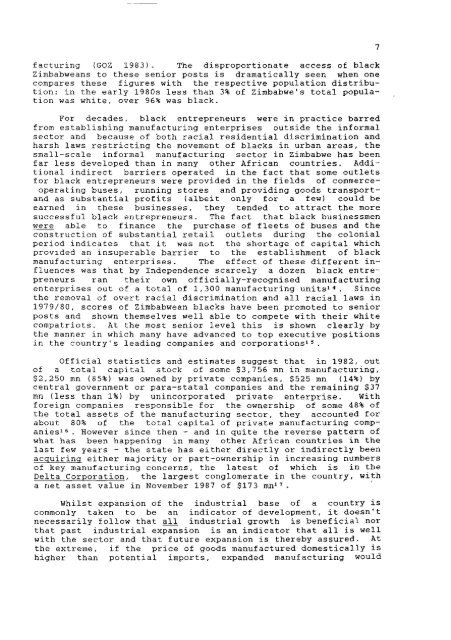Zimbabwe - Overseas Development Institute
Zimbabwe - Overseas Development Institute
Zimbabwe - Overseas Development Institute
Create successful ePaper yourself
Turn your PDF publications into a flip-book with our unique Google optimized e-Paper software.
f a c t u r i n g (GOZ 1983). The d i s p r o p o r t i o n a t e access of black<br />
<strong>Zimbabwe</strong>ans to these senior posts i s d r a m a t i c a l l y seen when one<br />
compares these f i g u r e s with the respective population d i s t r i b u <br />
t i o n : i n the e a r l y 1980s l e s s than 3% of <strong>Zimbabwe</strong>'s t o t a l populat<br />
i o n was white, over 96% was black.<br />
For decades, black entrepreneurs were i n p r a c t i c e barred<br />
from e s t a b l i s h i n g manufacturing enterprises outside the informal<br />
sector and because of both r a c i a l r e s i d e n t i a l d i s c r i m i n a t i o n and<br />
harsh laws r e s t r i c t i n g the movement of blacks i n urban areas, the<br />
small-scale informal manufacturing sector i n <strong>Zimbabwe</strong> has been<br />
f a r l e s s developed than i n many other A f r i c a n countries. Addit<br />
i o n a l i n d i r e c t b a r r i e r s operated i n the f a c t that some o u t l e t s<br />
for black entrepreneurs were provided i n the f i e l d s of commerceoperating<br />
buses, running stores and providing goods t r a n s p o r t -<br />
and as s u b s t a n t i a l p r o f i t s ( a l b e i t only for a few) could be<br />
earned i n these businesses, they tended to a t t r a c t the more<br />
s u c c e s s f u l black entrepreneurs. The f a c t that black businessmen<br />
were able to finance the purchase of f l e e t s of buses and the<br />
c o n s t r u c t i o n of s u b s t a n t i a l r e t a i l o u t l e t s during the c o l o n i a l<br />
period i n d i c a t e s that i t was not the shortage of c a p i t a l which<br />
provided an insuperable b a r r i e r to the establishment of black<br />
manufacturing e n t e r p r i s e s . The e f f e c t of these d i f f e r e n t i n <br />
fluences was that by Independence s c a r c e l y a dozen black entrepreneurs<br />
ran t h e i r own o f f i c i a l l y - r e c o g n i s e d manufacturing<br />
e n t e r p r i s e s out of a t o t a l of 1,300 manufacturing units''' . Since<br />
the removal of overt r a c i a l d i s c r i m i n a t i o n and a l l r a c i a l laws i n<br />
1979/80, scores of <strong>Zimbabwe</strong>an blacks have been promoted to senior<br />
posts and shown themselves w e l l able to compete with t h e i r white<br />
compatriots. At the most senior l e v e l t h i s i s shown c l e a r l y by<br />
the manner i n which many have advanced to top executive p o s i t i o n s<br />
i n the country's leading companies and corporations''.<br />
O f f i c i a l s t a t i s t i c s and estimates suggest that i n 1982, out<br />
of a t o t a l c a p i t a l stock of some $3,756 mn i n manufacturing,<br />
$2,250 mn (85%) was owned by p r i v a t e companies, $525 mn (14%) by<br />
c e n t r a l government or p a r a - s t a t a l companies and the remaining $37<br />
mn (less than 1%) by unincorporated p r i v a t e e n t e r p r i s e . With<br />
f o r e i g n companies responsible for the ownership of some 48% of<br />
the t o t a l assets of the manufacturing sector, they accounted f o r<br />
about 80% of the t o t a l c a p i t a l of p r i v a t e manufacturing companies'^<br />
. However since then - and i n quite the reverse pattern of<br />
what has been happening i n many other A f r i c a n countries i n the<br />
l a s t few years - the state has e i t h e r d i r e c t l y or i n d i r e c t l y been<br />
a c q u i r i n g e i t h e r majority or part-ownership i n i n c r e a s i n g numbers<br />
of key manufacturing concerns, the l a t e s t of which i s i n the<br />
Delta Corporation, the l a r g e s t conglomerate i n the country, with<br />
a net asset value i n November 1987 of $173 mn'.<br />
Whilst expansion of the i n d u s t r i a l base of a country i s<br />
commonly taken to be an i n d i c a t o r of development, i t doesn't<br />
n e c e s s a r i l y f o l l o w that a l l i n d u s t r i a l growth i s b e n e f i c i a l nor<br />
that past i n d u s t r i a l expansion i s an i n d i c a t o r that a l l i s w e l l<br />
with the sector and that future expansion i s thereby assured. At<br />
the extreme, i f the p r i c e of goods manufactured domestically i s<br />
higher than p o t e n t i a l imports, expanded manufacturing would
















